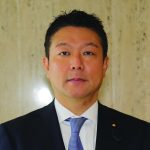TOKYO: Japanese Parliamentary Vice-Minister for Foreign Affairs Taro Honda said Kuwait and Japan have built a more multi-layered relationship through cooperation not only in the energy sector, but also in a wide range of fields. In an exclusive interview with Kuwait News Agency (KUNA) on the sidelines of a photo exhibition that marked the 60th anniversary of the establishment of Kuwait-Japan diplomatic ties, Honda also underscored a spirit of mutual aid that the two countries have maintained over the last 60 years.
"Japan and Kuwait have helped each other when both countries faced historical hardships. During and after Iraq's invasion of Kuwait in 1990, Japan provided a total amount of $13 billion of financial aid and dispatched the Japan Self Defense Force to the Arabian Gulf," said Honda. In the aftermath of the 2011 Great East Japan Earthquake, Kuwait provided swift and large-scale assistance to areas affected by the disaster by donating crude oil worth around JPY 40 billion ($350 million) and assisted its recovery efforts, he noted.
In addition, the late Amir Sheikh Sabah Al-Ahmad Al-Jaber Al-Sabah offered another $3 million donation to tsunami-damaged Aquamarine Fukushima and $2 million to the Japanese Red Cross Society during his state visit to Japan in 2012, he noted. Honda also expressed appreciation for the significant role of Kuwait as a major oil producing and exporting country. "Kuwait is Japan's no. 3 crude oil exporter, providing about 9 percent of its oil imports, while Japan is the third largest importer of Kuwait's oil," said the official.
Relationship in other economic fields between the two countries has also deepened, including investment by Japanese companies in the development of electricity and water infrastructure. He also shed light on the Kuwaiti Japanese Businessmen Committee and voiced expectation for its future activities.
In terms of politics, Honda stressed that peace and stability in the Middle East is extremely important for Japan, which depends on the region for 90 percent of its oil imports. He hailed Kuwait's serious diplomatic efforts in the Middle East and the international community, saying, "Kuwait values regional balance and actively supports humanitarian assistance in conflict areas such as Iraq and Syria."
The official also commended the long and amicable relationship between the imperial and royal families of the two countries, highlighting their mutual visits, including Japanese Emperor Naruhito's visit to Kuwait in 1995 in his capacity as Crown Prince, which was the first visit by members of the Japanese imperial family to Kuwait.
Asked about future Japan-Kuwait relations with the 60th anniversary of the establishment of diplomatic ties, Honda responded that bilateral cooperation in such areas as politics, economy and culture based on a "comprehensive partnership", which was determined during then Minister Shinzo Abe's visit to Kuwait in 2013, will continue to be the core of bilateral relations. The official expressed hope that, besides their traditional friendly ties, the two countries will reinforce their cooperation towards the stability of the Middle East and vulnerable regions in the international community.
"Kuwait has been actively working to solve problems not only in the Middle East but also in other regions. Furthermore, in response to COVID-19, Japan and Kuwait have together contributed to ensuring equitable access to vaccines in developing countries by providing assistance through the COVAX facility," he said. In addition, Honda said bilateral relations in areas of education and cultural exchanges should be advanced. - KUNA
.jpg)




